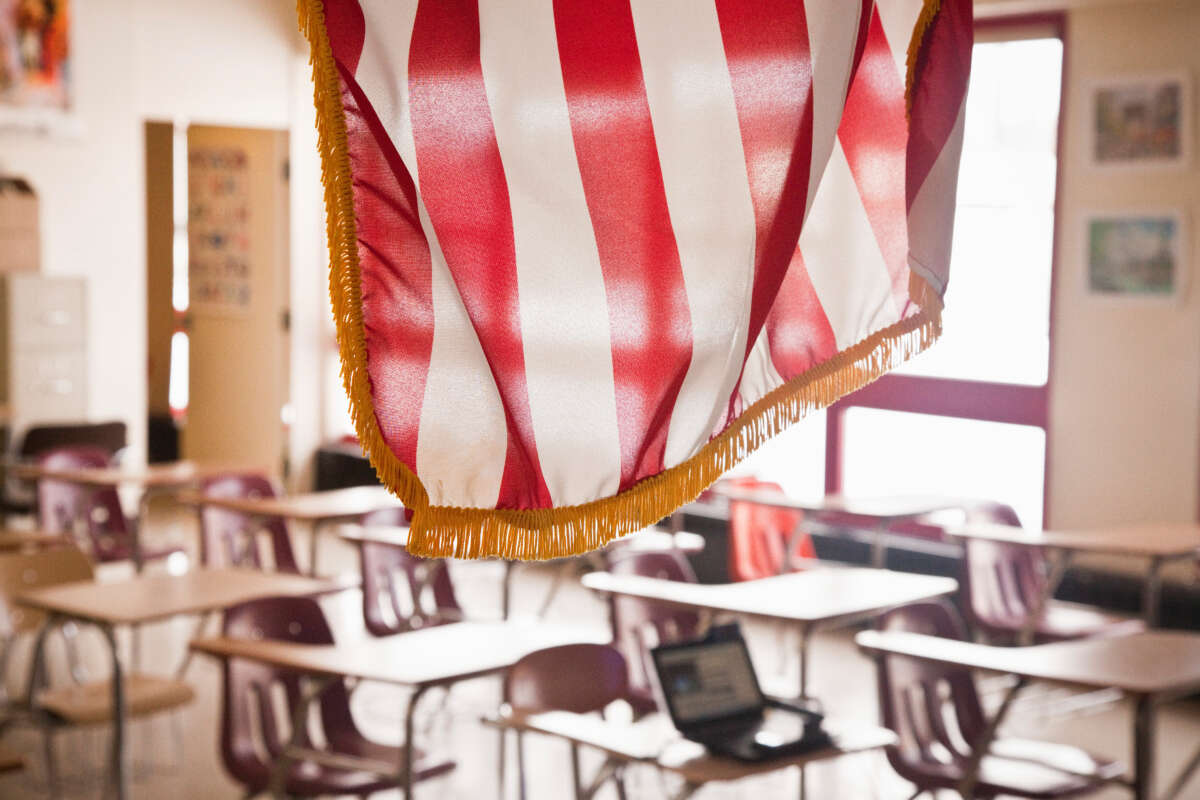A 15-year-old in South Carolina is suing her school district for violating her civil rights after a teacher assaulted her in the hallway for refusing to recite the Pledge of Allegiance.
Marissa Barnwell, a Black honor roll student at River Bluff High School, was walking to her classroom on November 29, 2022 — her birthday — when a teacher, Nicole Livingston, grabbed her and held her against a wall while the pledge was being recited.
Livingston, whom Barnwell does not have a class with, demanded that Barnwell stop walking and acknowledge the pledge, according to the lawsuit, which lists the teacher and the state Department of Education as co-defendants. Livingston then sent Barnwell to the principal’s office to face further discipline.
Although other students were walking in the hallway and not reciting the pledge, Barnwell was the only student targeted, the lawsuit notes. Barnwell was the only Black student in the hallway, and the school is predominately white.
After discussing the situation with Barnwell, the principal decided against punishing her and agreed to watch security camera footage of the attack. Barnwell’s mother later called the school, in tears, after learning that her daughter had been targeted.
Since then, no action has been taken, despite Barnwell and her parents repeatedly calling for the school to take disciplinary measures against the teacher.
“No one has apologized, no one has acknowledged my hurt. … The fact that the school is defending that kind of behavior is unimaginable,” Barnwell said at a press conference last week.
The school, the teacher, the principal and the district have yet to issue a formal apology. Only after the lawsuit was filed did the principal call the Barnwell family.
That call “should have been done right after the incident” happened, Barnwell’s father said.
At a January 10 school board meeting, Barnwell and her parents pleaded with the district to discipline the teacher for her action months prior — but the district refused to act, the family notes in the lawsuit.
“I feel like something should have happened to the teacher, and the teacher should have been handled appropriately, where she is either arrested or fired,” Barnwell told The New York Times. “But nothing like that’s happened and she still works there.”
The First Amendment of the U.S. Constitution protects Americans’ right not to partake in the Pledge of Allegiance, and the state of South Carolina has laws saying that students do not have to participate in the pledge as long as their decision to abstain doesn’t prevent others from choosing to participate.
Barnwell and her family note in the lawsuit that she hasn’t recited the pledge since she was in third grade, when she realized that the principle of “liberty and justice for all” is not applied to everyone in the United States. Barnwell has said that she was inspired in part by NFL player Colin Kaepernick, who protested police brutality and racial injustice by kneeling during the National Anthem at games. She was also inspired to “[stand] up for Black people” by the 2020 uprisings in response to the police killings of George Floyd, Breonna Taylor, and others, she told The Times.
In fifth grade, a teacher from Barnwell’s elementary school called her parents to inform them that she was not participating in the pledge. Barnwell’s parents told the teacher that they wouldn’t force her to do something she didn’t agree with, and the situation did not escalate further.
Data from an American Psychological Association study in 2021 shows that Black children in schools across the U.S. are often subject to much harsher discipline than their white counterparts, even over minor infractions like dress code violations. The study found that 26 percent of Black students who engaged in a minor school code offense were issued at least one suspension for doing so, compared to just 2 percent of white students.
The Pledge of Allegiance has historically been used as a weapon to condemn those who don’t participate as unpatriotic. Nativists and white supremacists have also used the pledge to attack people they deem “un-American” based on race or immigration status.
There are myriad examples of Black students being assaulted or subjected to discipline for their refusal to participate in the pledge.
In July 2019, a guard at the Virginia statehouse aggressively grabbed a Black teen and forced him to stand up when a legislative chamber began reading the pledge; in October 2020, an 11-year-old Black student in Florida was suspended from school for three days and arrested when he refused to recite the pledge and called the U.S. flag racist; and in fall of 2017, white students in Alabama threatened to lynch Black students who were speaking out against racism in the U.S after another white student at the school was disciplined for using abusive language toward a Black student who didn’t recite the pledge.
In an op-ed for EdWeek in the fall of 2021, Richard O. Welsh, a professor of education and public policy at Peabody College of Vanderbilt University, noted that disparities in disciplinary action toward Black students versus their white counterparts are, “in many ways, byproducts of larger issues in K–12 schooling, such as a lack of workforce diversity, weak classroom management, and shortfalls in the cultural capability of teachers.”
“Given this, there is no silver bullet,” Welsh wrote. “Instead, strategic coordination of various alternative approaches to exclusionary discipline is critical, as these levers work in tandem to dismantle disparities. Policies prohibiting suspensions for less severe offenses, for example, can be coupled with a school-based program such as Restorative Practices and augmented by professional development on classroom management and culturally responsive practices for teachers and school leaders.”
Media that fights fascism
Truthout is funded almost entirely by readers — that’s why we can speak truth to power and cut against the mainstream narrative. But independent journalists at Truthout face mounting political repression under Trump.
We rely on your support to survive McCarthyist censorship. Please make a tax-deductible one-time or monthly donation.
